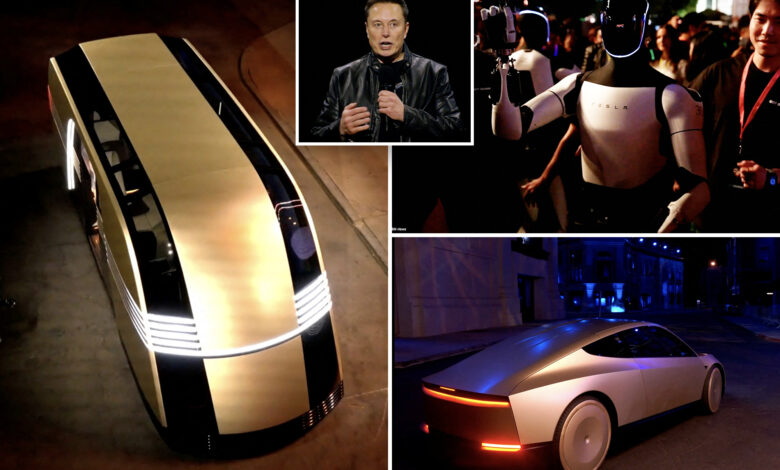Elon Musk unveils surprise ‘robovan’ at flashy Tesla event, says Optimus humanoid robots will cost less than a car

Elon Musk unveiled three new Tesla high-tech products — including a surprise autonomous passenger van — at a highly anticipated event in California Thursday night.
Musk rode up to the stage in the long-awaited driverless “Cybercab” that Tesla was expected to showcase during the evening titled “We, Robot,” at Warner Bros. Studio.
But a never-before-seen 20-person “robovan” and the newest generation of Tesla’s humanoid robots also made their debuts during the reveal, which was live-streamed with more than 3.6 million viewers at one point.
Tesla deployed 20 two-door, fully autonomous “Cybercabs” to drive attendees around the studio while dozens of its Optimus humanoid robots served drinks and played rock-paper-scissors with guests.
“The autonomous future is here,” Musk said. “We have 50 fully autonomous cars here tonight. You’ll see model Ys and the Cybercab. All driverless.”
Notably, the two-door “Cybercab” comes without a steering wheel, pedals or charging port. The electric vehicle features inductive charging capabilities and gull-wing doors.
“There’s no steering wheel or pedals so I hope this goes well,” Musk joked on stage.
The Tesla CEO said the self-driving taxis would be rolled out “before 2027” and would be available for under $30,000 apiece and an operating cost of 20 cents a mile.
“We expect to be in production with the ‘Cybercab’ … in probably — well, I tend to be a little optimistic with time frames — but in 2026. Before 2027, let me put it that way,” Musk said, admitting his numerous broken promises of earlier roll-outs dating back to 2020.
His idea for the Cybercabs is to make them available to hail through Tesla’s own app, where owners of the taxis could rent out a whole fleet of the driverless EVs.
But the prototypes unveiled Thursday are not yet road-ready since they still need to be supervised by a real human — much like the self-driving modes available on current Teslas on the market.
“We’ll move from supervised full self-driving to unsupervised full self-driving, where … you could fall asleep and wake up at your destination,” Musk said of the company’s hopes.
Tesla’s autonomous driving tech varies from its competitors which already operate driverless robotaxis in select cities today. The tech is more cost effective in the long run but experts say it’s riskier and will take longer to get up and running.
Tesla’s strategy relies solely on a combination of cameras and artificial intelligence to make driving decisions, while competitors like Waymo, Amazon’s Zoox, General Motors’ Cruise and a host of Chinese firms use a similar strategy plus additional technology like radar, lidar and complex mapping.
The robovans would run on the same technology.
Musk also brought out the newest generation of Tesla’s Optimus robots, as he tries to move Tesla’s image away from solely being an auto manufacturer to that of an AI robotics company.
He said he expects the faceless robot helpers to cost less than a car down the line at $20,000 to $30,000 so that anybody could own one.
“So what can it do? It’ll be able to do anything you want,” Musk told the crowd. “So it can be a teacher or babysit your kids. It can walk your dog, mow your lawn, get the groceries, just be your friend, serve drinks, whatever you can think of, it will do.”
“I think this will be the biggest product ever of any kind.”




